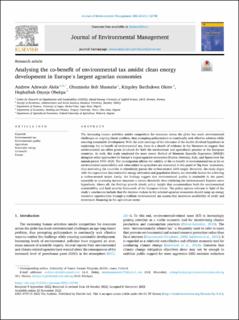| dc.contributor.author | Alola, Andrew Adewale | |
| dc.contributor.author | Muoneke, Obumneke Bob | |
| dc.contributor.author | Okere, Kingsley Ikechukwu | |
| dc.contributor.author | Obekpa, Hephzibah Onyeje | |
| dc.coverage.spatial | Europe | en_US |
| dc.date.accessioned | 2023-08-28T12:00:44Z | |
| dc.date.available | 2023-08-28T12:00:44Z | |
| dc.date.created | 2023-01-25T15:09:30Z | |
| dc.date.issued | 2022 | |
| dc.identifier.issn | 0301-4797 | |
| dc.identifier.uri | https://hdl.handle.net/11250/3086005 | |
| dc.description.abstract | The increasing human activities amidst competition for resources across the globe has made environmental challenges an ongoing classic problem, thus prompting policymakers to continually seek effective solution while ensuring sustainable development. With the wide coverage of the relevance of the double dividend hypothesis in explaining the co-benefit of environmental tax, there is a dearth of evidence in the literature to suggest that environmental tax offers green dividends for both the environment and agricultural practice in the European countries. As such, this study employed the more recent Method of Moments Quantile Regression (MMQR) alongside other approaches for Europe’s largest agrarian economies (France, Germany, Italy, and Spain) over the annual period 1995–2020. The investigation affirms the validity of the co-benefit of environmental tax as far as environmental sustainability and value-added to agriculture are concerned in this panel of ‘Big Four’ economies, thus motivating the countries to relentlessly pursue the carbon-neutral 2050 target. Moreover, the study aligns with the expectation that renewable energy utilization and population density are desirable factors for achieving a carbon-neutral target. Lastly, the findings suggest that environmental quality is attainable in the panel, especially as increasing income surpasses a certain threshold, thus validating the environmental Kuznets curve hypothesis. Above all, the findings provide timely policy insight that accommodates both the environmental
sustainability and food security framework of the European Union. The policy options relevant in light of the study’s conclusions include that the decision makers in the selected agrarian economies should ramp up energy transition opportunities through a resilient environmental tax system that incentives availability of credit and investment financing in the agriculture sector. | en_US |
| dc.language.iso | eng | en_US |
| dc.rights | Navngivelse 4.0 Internasjonal | * |
| dc.rights.uri | http://creativecommons.org/licenses/by/4.0/deed.no | * |
| dc.subject | environmental tax | en_US |
| dc.subject | environmental quality | en_US |
| dc.subject | agriculture | en_US |
| dc.subject | renewable energy | en_US |
| dc.subject | co-benefit | en_US |
| dc.subject | Europe | en_US |
| dc.title | Analysing the co-benefit of environmental tax amidst clean energy development in Europe's largest agrarian economies | en_US |
| dc.type | Peer reviewed | en_US |
| dc.type | Journal article | en_US |
| dc.description.version | publishedVersion | en_US |
| dc.subject.nsi | VDP::Samfunnsvitenskap: 200::Økonomi: 210 | en_US |
| dc.source.volume | 326 | en_US |
| dc.source.journal | Journal of Environmental Management | en_US |
| dc.identifier.doi | 10.1016/j.jenvman.2022.116748 | |
| dc.identifier.cristin | 2114872 | |
| cristin.ispublished | true | |
| cristin.fulltext | postprint | |
| cristin.qualitycode | 1 | |

